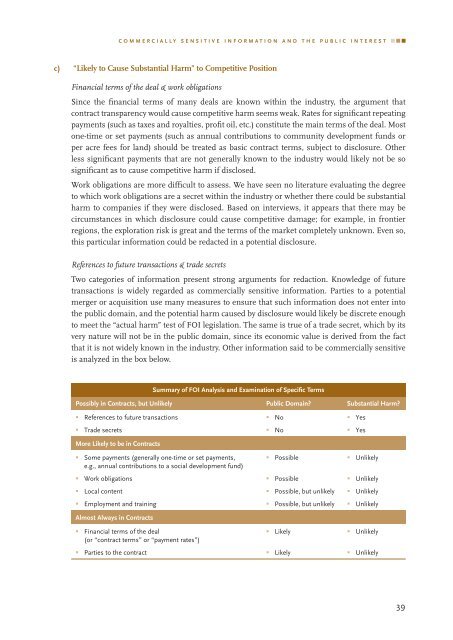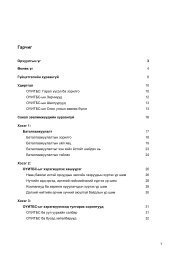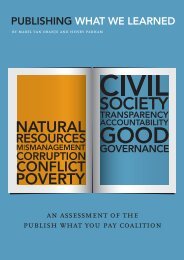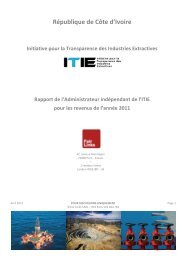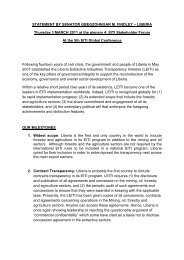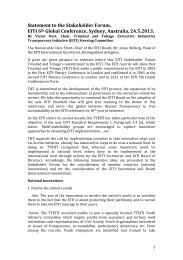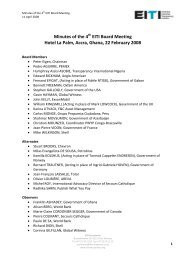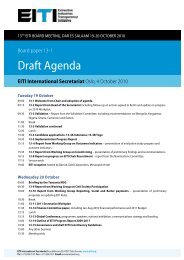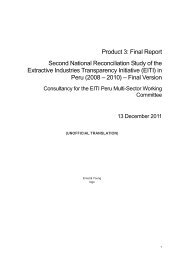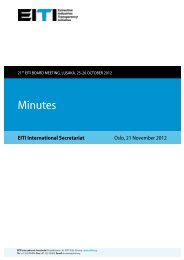CONTRACTS CONFIDENTIAL: - Good Law and Practice
CONTRACTS CONFIDENTIAL: - Good Law and Practice
CONTRACTS CONFIDENTIAL: - Good Law and Practice
Create successful ePaper yourself
Turn your PDF publications into a flip-book with our unique Google optimized e-Paper software.
COMMERCIALLY SENSITIVE INFORMATION AND THE PUBLIC INTEREST<br />
c) “Likely to Cause Substantial Harm” to Competitive Position<br />
Financial terms of the deal & work obligations<br />
Since the financial terms of many deals are known within the industry, the argument that<br />
contract transparency would cause competitive harm seems weak. Rates for significant repeating<br />
payments (such as taxes <strong>and</strong> royalties, profit oil, etc.) constitute the main terms of the deal. Most<br />
one-time or set payments (such as annual contributions to community development funds or<br />
per acre fees for l<strong>and</strong>) should be treated as basic contract terms, subject to disclosure. Other<br />
less significant payments that are not generally known to the industry would likely not be so<br />
significant as to cause competitive harm if disclosed.<br />
Work obligations are more difficult to assess. We have seen no literature evaluating the degree<br />
to which work obligations are a secret within the industry or whether there could be substantial<br />
harm to companies if they were disclosed. Based on interviews, it appears that there may be<br />
circumstances in which disclosure could cause competitive damage; for example, in frontier<br />
regions, the exploration risk is great <strong>and</strong> the terms of the market completely unknown. Even so,<br />
this particular information could be redacted in a potential disclosure.<br />
References to future transactions & trade secrets<br />
Two categories of information present strong arguments for redaction. Knowledge of future<br />
transactions is widely regarded as commercially sensitive information. Parties to a potential<br />
merger or acquisition use many measures to ensure that such information does not enter into<br />
the public domain, <strong>and</strong> the potential harm caused by disclosure would likely be discrete enough<br />
to meet the “actual harm” test of FOI legislation. The same is true of a trade secret, which by its<br />
very nature will not be in the public domain, since its economic value is derived from the fact<br />
that it is not widely known in the industry. Other information said to be commercially sensitive<br />
is analyzed in the box below.<br />
Summary of FOI Analysis <strong>and</strong> Examination of Specific Terms<br />
Possibly in Contracts, but Unlikely Public Domain? Substantial Harm?<br />
References to future transactions<br />
Trade secrets<br />
More Likely to be in Contracts<br />
Some payments (generally one-time or set payments,<br />
e.g., annual contributions to a social development fund)<br />
Work obligations<br />
Local content<br />
Employment <strong>and</strong> training<br />
Almost Always in Contracts<br />
Financial terms of the deal<br />
(or “contract terms” or “payment rates”)<br />
Parties to the contract<br />
No<br />
No<br />
Possible<br />
Possible<br />
Possible, but unlikely<br />
Possible, but unlikely<br />
Likely<br />
Likely<br />
Yes<br />
Yes<br />
Unlikely<br />
Unlikely<br />
Unlikely<br />
Unlikely<br />
Unlikely<br />
Unlikely<br />
39


